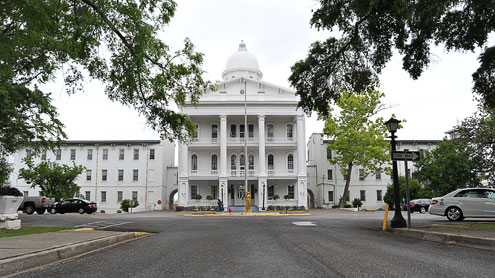Gov. Robert Bentley recently announced that the mental health facilities project, which stalled in recent months, would resume construction.
Bentley originally ordered construction of the new Bryce Hospital to cease in March in order to consider six potential plans drafted by Mental Health Commissioner Zelia Baugh.
Under the plan, the state will close two mental health hospitals while patients are moved into community-based care. The plan will also allow for the new 268-bed Bryce facility to open as scheduled in 2013. Patients at the current Bryce will be moved into new Bryce when construction is complete.
The Alabama Department of Mental Health described the current population of Bryce as a mix of inpatient psychiatric services for adults in the north central part of the state and inpatient services for adolescents from the entire state.
This decision ensures that no criminally committed patients will be moved into Bryce.
The Taylor Hardin Secure Medical Facility will remain open. Taylor Hardin is also located in Tuscaloosa and is the only maximum-security forensic facility operated by the Department of Mental Health.
Additionally, the North Alabama Regional Hospital will remain open, as will the Mary Starke Harper Geriatric Psychiatry Center located on the old Bryce property.
Bentley acknowledged the budget concerns facing the state but also said that patient care and public safety will be the top priority when moving forward.
State Representative John Merrill, a Republican from Tuscaloosa, stood behind Bentley while he announced the changes. He said in a phone interview that he was pleased and excited about the governor’s decision.
Merrill also said the state needs to continue to evaluate the effectiveness of group home settings and to continue to meet the needs of mental health consumers.
“This is the bottom line,” Merrill said. “We’re charged in the Bible to take care of those who cannot take care of themselves.”
Despite being a fiscal conservative, Merrill said he does not support cutting any more from the budget of the Mental Health Department.
“We can’t treat these people like we do roads and bridges or any type of state agency,” Merrill said. “We’re talking about people’s lives here.”
Tuscaloosa Mayor Walt Maddox was unable to be reached for comment by printing time but was reportedly happy with Bentley’s decision.
“Based on conversations with the governor, he felt a facility for those in distress was in the best interest for consumers,” Maddox said to The Tuscaloosa News. “Obviously, we are very pleased with the governor and the Department of Mental Health on the property.”
Jimmy Walsh, the president of NAMI Alabama, a leading mental health advocacy group, does not think the current plan is enough and said the Department of Mental Health needs more funding to improve the quality of care in the state.
“The unfortunate thing is that there is plenty of money in Alabama. We’re just not going to spend it on people,” Walsh said. “The whole idea of government is to work together to make sure the common good is taken care of, but we don’t always do that.”
Despite his criticisms of Bentley’s plan, Walsh did approve of the job that Baugh was doing but wanted to see her with an increased budget with which to operate.
“The medicine is not to a point where we can say definitely that this person, with a serious mental illness, is going to be able to return confidently into society,” Walsh said. “Until we can say that, we’re going to have to have some provision for long-term beds to take care of people who are just beyond current medical knowledge to help.”







